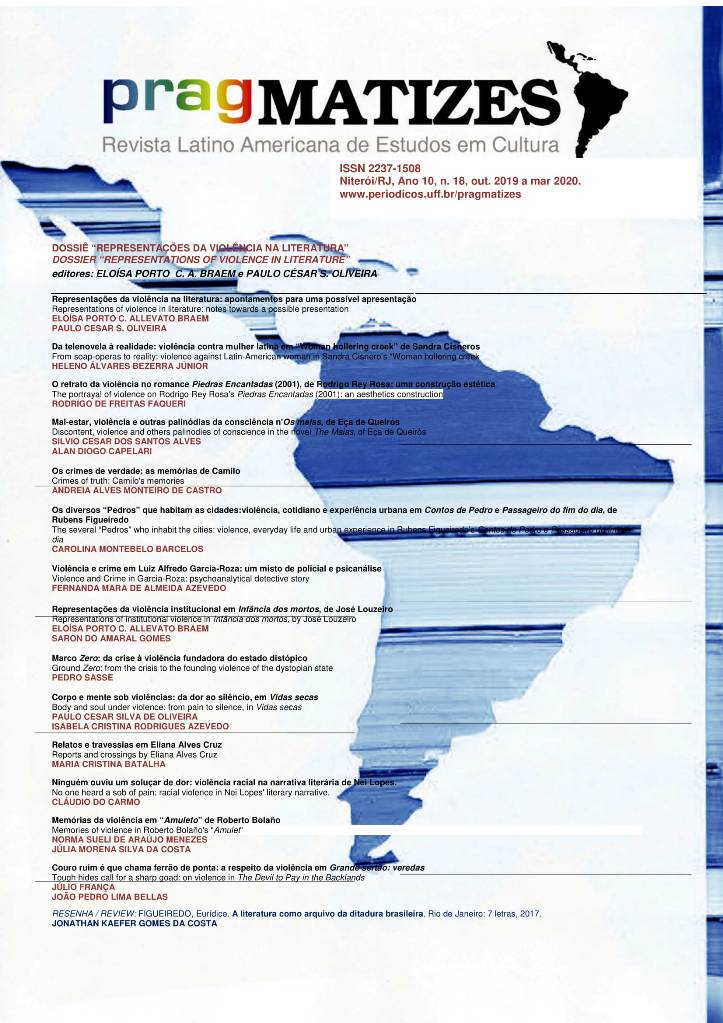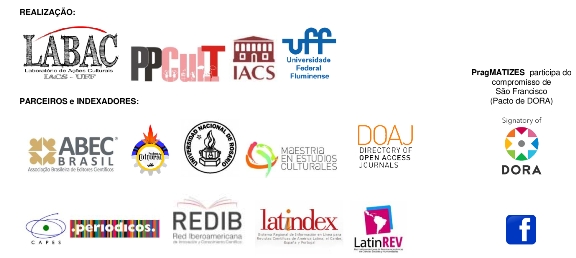Discontent, violence and others palinodies of conscience in the novel The Maias, of Eça de Queirós
DOI:
https://doi.org/10.22409/pragmatizes.v10i18.40277Keywords:
Discontent, Violence, Conscience, Eça de Queirós, The MaiasAbstract
The methodology utilized in this paper was the comparatist, specially its strand founded on the dialogue between literature and other fields of knowledge, mostly, “the study of literature in its intersections to philosophy”, which here is used “as theoretical paradigm” Not sub estimating “the possibilities offered to the philosophical thought by literature” (ALVES; CEI; DIOGO; 2018, p. 6), and “conjugating philosophy and literature in such a way that the philosophical content e literary form become indissociable” (ALVES; CEI; DIOGO; 2018, p. 6-7) – because “fictionality theory and the fiction theoretical strength create porosity in between the fields of literature and philosophy” -, it was sought, in general terms, “the subversion of the borders traditionally established between philosophical content and literary content”, as well as “the scrutiny of the multiple articulations between literature and philosophy, regarding the polymorphous character of its signs” (ALVES; CEI; DIOGO; 2018, p. 7). In specific terms, we proposed the attrition, the friction, the contamination between the thought of the two greatest theorists of the XIX Century culture, Friedrich Nietzsche – bearing in mind his On the Genealogy of Morality (1887) – and Sigmund Freud – focusing on Civilization and Its Discontents (1930) -, and the fictional work from the Portuguese writer Eça de Queirós, the novel The Maias (1888). This novel has, in its composition, a vast repository of themes, questioning, and reflections which, besides covering all the long XIX Century, make the work remain until contemporaneity as an object of attention to readers and researchers. In the present work, we are going to analyze, specifically, the social implications present in the outcome of Carlos da Maia and Maria Eduarda love relationship, the conflicts of Carlos’ moral conscience amidst the discovery that he lived a prohibited love, and the resulting violence of those conflicts, be the one directed against the subject itself, or the one directed toward the others. Moreover, we are going to pay attention to the social critique that is a mark of Eça’s work. What can be noticed is a society shrewd when dealing with question that can compromise the image of the civilized subject. It’s possible to note that the relationship between civilization and civility show itself complex, and many times, in this novel, the acquaintanceship rules, said to be civilized, use methods which refer to barbarism.
Downloads
References
ALVES, Silvio Cesar dos Santos. A insustentável leveza das flores. Queirosiana: Estudos sobre Eça de Queirós e sua Geração, Baião, n. 25/26, p. 31-50, 2018.
______. O ceticismo na ficção queirosiana. Projeto de Pesquisa. Londrina: Departamento de Letras Vernáculas e Clássicas, CLCH, UEL, 2017.
______. Uma proposta de evolução estética na obra de Eça de Queirós. CADERNOS DA FaEL. Vol. 2, nº 6, p. 01-26, set./dez. de 2009. Disponível em: http://perseu.unig2001.com.br/cadernosdafael/vol2_num6/ARTIGO%20SILVIO%20CADERNOS%206%20NO%20FORMATO%20E%20REVISADO.pdf
ALVES, Silvio Cesar dos Santos; CEI, Vitor; DIOGO, Sarah Forte. Prefácio. In: ______ (Orgs). Ética, estética e filosofia da literatura. Rio de Janeiro: ABRALIC, 2018, p. 6-8.
FREUD, Sigmund. O mal-estar na cultura. Porto Alegre: L&PM, 2010.
______. Obras completas, volume 11: totem e tabu, contribuição à história do movimento psicanalítico e outros textos (1912-1914). São Paulo: Companhia das Letras, 2012.
GARRETT, Almeida. Viagens na minha Terra. Porto: Porto Editora, [s./d.].
NIETZSCHE, Friedrich. Genealogia da moral – Uma polêmica. São Paulo: Companhia das Letras, 1998.
QUEIRÓS, Eça de. Os Maias. Porto: Livraria Internacional de Ernesto Chardron, 1888. Disponível em: http://www.dominiopublico.gov.br/download/texto/bv000083.pdf
SNOW, C. P. Os realistas: retratos de oito romancistas. Rio de Janeiro: José Olímpio, 1988.
WEISSTEIN, Ulrich. Literatura Comparada: Definição. In: COUTINHO, Eduardo; CARVALHAL, Tânia Franco (Org.). Literatura Comparada: Textos fundadores. Rio de Janeiro: Rocco, 1994, p. 308-333.
Downloads
Published
How to Cite
Issue
Section
License
By forwarding an original to PragMATIZES, the authors agree that the copyright related to it is transferred to the Publishing. Articles and other writings are made available in PDF format from their publication, and they can be downloaded to institutional repositories and personal pages, provided that with their proper bibliographic indication.



